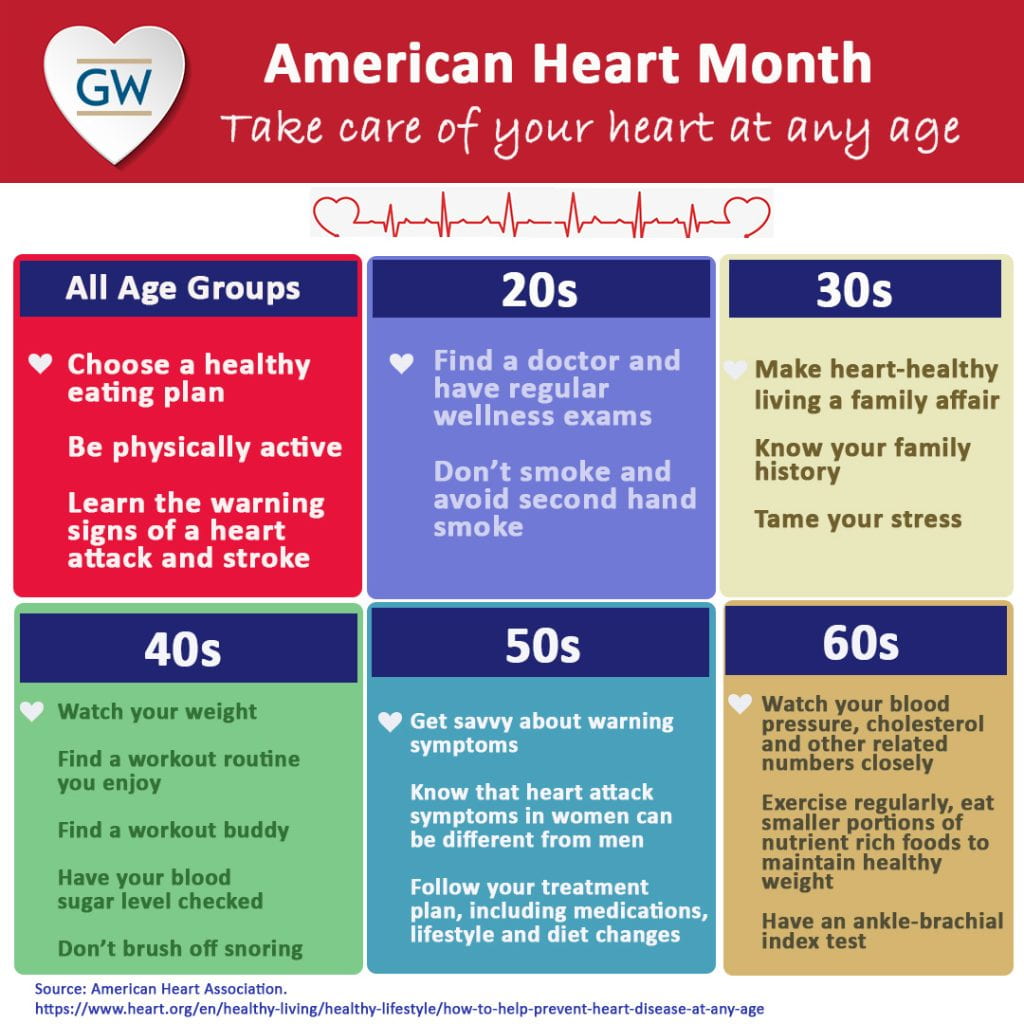
February is American Heart Month, making it a great time to take care of your heart at any age! It’s also a great time to encourage your patients to do the same. So this year for Valentine’s Day, don’t forget to show your heart some love! Regardless of your age, making smart choices now can have a large impact on heart health for the rest of your life. This post will focus on tips from the American Heart Association that can help adults of all ages keep their hearts healthy.
All Age Groups:
It’s never too early, or too late, to start making heart-healthy choices! The following are some things you can do to help keep your heart healthy at any stage of life.
- Choose a Healthy Eating Plan: The foods you eat can have a sizable impact on your risk for heart disease and stroke. Make heart-healthy foods a regular part of your daily eating habits. A good general rule of thumb is to choose foods that are low in saturated and trans fats, and are low in sodium. Heart-healthy foods include:
- Fruits
- Vegetables
- Whole grains (high-fiber)
- Fish (oily fish, at least twice a week)
- Nuts
- Legumes
- Seeds
- Meatless meals
- Be Physically Active: If you already live an active lifestyle, keep up the great work! If this is an area in which you could use some improvement, start small and work up to 2 ½ hours of moderate-intensity aerobic activity, or 1 hour and 15 minutes of vigorous-intensity aerobic activity a week. Only 150 minutes a week of brisk walking, or 75 minutes of jogging or running is a great way to keep your heart in shape. Adding muscle-strengthening exercises a couple of days a week like weight training or resistance training can have added benefits such as strengthening bones, muscles, tendons, and ligaments, which can lead to a better quality of life.
- Learn Stroke & Heart Attack Warning Signs: Not everyone has the same symptoms when they experience a stroke or a heart attack. Knowing the warning signs can help you take symptoms more seriously and seek medical attention early if you or someone you know is experiencing symptoms.
20s:
Taking care of your heart in your 20s can be as simple as having regular wellness exams with your doctor, being physically active, not smoking, and avoiding secondhand smoke.
30s:
Balancing family, career, and heart health can be tricky, but it can be done! Getting the whole family involved in creating heart-healthy habits is a great way to start! Go for family bike rides, take the dog for a walk, and get everyone involved in preparing healthy meals.
Knowing your family’s medical history can help identify risk factors that can put you at a higher risk of heart disease. This can help you focus on the risk factors that you can control, such as diet, exercise, and not smoking. Monitoring stress levels is also important in preventing an increased heart rate, high blood pressure, and damage to artery walls.
40s:
In your 40s, watching your weight becomes more important, so sticking to that healthy diet and living an active lifestyle will become even more meaningful. Checking your blood sugar and having regular heart-health screenings will provide good baseline results for future checks. And if you're a snorer, don’t ignore it. Sleep apnea can contribute to high blood pressure, heart disease, and stroke, so address snoring issues early.
50s:
In your 50s, eating a healthy diet is important, so be sure you’re getting enough fruits, vegetables, high-fiber whole grains, fish, nuts, legumes, and seeds. Remind yourself of the warning signs of heart attack and stroke! And be sure to stick to your treatment plan if you’ve been diagnosed with high blood pressure, high cholesterol, or diabetes. Following a treatment plan to manage these conditions can lower your risk for heart attack or stroke.
60s and Older:
As we age, the risk of heart disease increases. Watching your blood pressure and cholesterol numbers become increasingly important. The 60s are also a great time to have an ankle-brachial index test to assess the pulses in your feet, which can help diagnose peripheral artery disease (PAD). As you age, it also becomes increasingly important to exercise regularly, and eat smaller portions of nutrient-rich foods to help you maintain a healthy weight.
References:
American Heart Association. (April 1, 2015). How to help prevent heart disease at any age. American Heart Association. https://www.heart.org/en/healthy-living/healthy-lifestyle/how-to-help-prevent-heart-disease-at-any-age

